There are wine lovers who are fascinated by wine but only outside the gates of the winery. The drinking of wine, maybe matching wine with food and endless discussions about the merits of this wine against that, provides adequate satisfaction.
Then there is a growing number who want to witness the creation of a wine, to participate in how it is made. They yearn to smell the aromas during fermentation and have the challenge of blending, aiming for that elusive result of 1+1=3, when the finished wine is hopefully better than the sum of its parts.
Others are fascinated with the vineyard and the differences between “growing wine” and “growing grapes.” They want to experience working the land and coping with the vagaries of the seasons. For them, the question is how something as ancient and well established as a vine, with the humble, unpretentious grape as its fruit, can produce something as exalted and celebrated as wine. For these people, buying, drinking, and talking about wine is not enough. They want to become more involved, to get down and dirty in the earth and the wine itself.
How to participate in wine
For those who want to participate more fully, there are options.
It can start with planting a vine in the same way our grandparents once planted a tree. There is no practical involvement, but there is a feel-good factor. This sounds a little basic, but it is the reason that Israel is the only country in the world with more trees than it had 100 years ago.
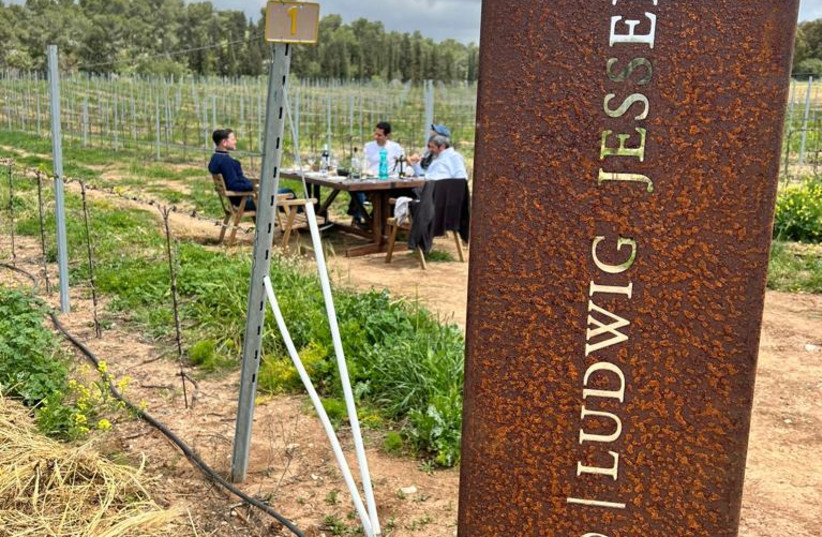
Adam Scott Bellos is short in stature, but a double magnum in terms of personality. A reasonably new oleh with the drive of a bulldozer and the attitude of a revolutionary, he sees everything through wine-tinted spectacles. I can relate to that. When he sees a vine growing in Israel, he sees the Magen David flag; and when he sees the flag, he is thinking of wine as Israel’s most visual representative.
Bellos is the founder of the concept Wine on the Vine, a project of the Israel Innovation Fund. Echoing the Jewish National Fund’s Plant a Tree campaign, it offers people the chance to plant a vine for $18 or to plant and dedicate a vineyard to someone. You can buy your vine, receive a certificate, and feel you have a toe in the earth of the Land of Israel.
Bellos has a good range of wineries supporting this project, such as Bravdo; Ella Valley; Gush Etzion; Jonah; Kabir; Maia; Shiloh; and Tulip. Wine on the Vine offers the opportunity to purchase wines, organize wine tours, and attend wine-themed parties, which Bellos has become famous for organizing. He also has his Wine with Adam video podcast, where he meets celebs and politicians over a glass of wine.
IF YOU want to become more practically involved, you can actually learn winemaking and become a winemaker by enrolling at the Soreq Winery Winemaking School. This was founded by the modest, unassuming, quiet Nir Shaham in 1994, nearly 30 years ago.
Shaham offers passionate wine lovers the opportunity to really get involved through real winemaking. Also, he teaches home winemakers how to do it properly. Shaham is patient and very giving as a teacher and role model. His laissez-faire style encourages self-expression, always adapting to the character of the student, the particular vintage, and the grapes available.
This is not someone teaching by rote out of a book. Absolutely no one leaves his hands with less passion than they had before; and, of course, they leave with knowledge, self-confidence, and pride at having made their own wine with no corners cut.
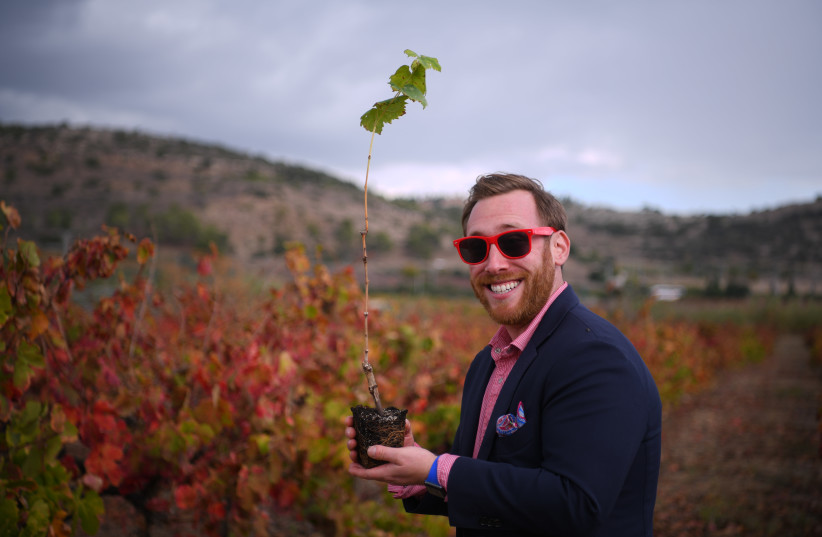
Usually, beginners return for the next, more advanced course on the ladder to becoming more proficient. Countless future professionals learned the basics under his wing. The number of winemakers, who feature Soreq near the beginning of their CV, runs into three figures. As such, Shaham has been one of the most influential Israeli educators in our wine revolution, though he would be the last person to say this and beat his own drum.
Now there is a totally new initiative that offers an enriched opportunity to be involved, by planting one’s own vineyard. On offer is a half-dunam vineyard, which is the minimum size of a plot or parcel. This will add up to approximately 150 vines, which will have the potential to produce a barrel of wine.
As experts will advise, the new vineyard owners can be as involved as they like, but the plot will be managed on their behalf. At the end of the growing and winemaking cycle, the investor will have 300 bottles of his or her own wine to share and enjoy. This is what Anava Vineyards, founded by Nadav Jesselson, is offering. For those in business or wine industry circles, that is a name to be reckoned with.
His father, Benjamin Jesselson, once associated with Elite and Strauss as a long-term board member, is now a board member of Carmel Winery, the historic winery of Israel. He has been part of the new ownership, steering an impressive turnaround of what is the largest winery in Israel.
Nadav served his time working at Jesselson Investments, but he remembers once working at a vineyard in Mitzpe Ramon, which struck a chord and remained a positive memory. When he moved to Nechusha, he and Moriah, his wife and partner, decided to “trade our spreadsheets for sprinklers and our graphs for grapes.”
Accordingly, they bought an olive grove in the Judean Foothills Wine Region, not far from Lachish, in between Beit Shemesh and Kiryat Gat. The next stage was to plant a vineyard. Here, he was encouraged by Hanan Bazak, wine grower and former director of the Israel Wine & Grapes Board, who told him, “Plant a vineyard, and I will buy the fruit.”
Nadav then approached Dror Dotan, manager of the agricultural department for Carmel Winery, and received valued professional advice and enthusiastic support. Dotan told him he needed to plant a minimum of 50 dunams to be relevant for Carmel but should aim for 300 dunams for a viable business.
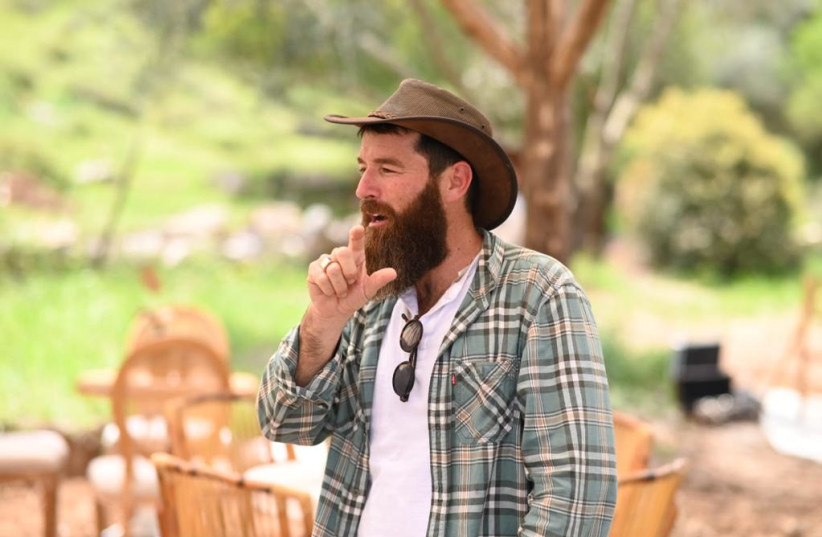
SO JESSELSON initially planted 50 dunams of Cabernet Sauvignon and Petite Sirah. In a swift turnaround, the businessman had metamorphosed into a farmer and grower. It was Moriah who gave the name “Anava” to their project. Depending on how the word is spelled in Hebrew, it means “grape” or “humility,” which Jesselson says is an important attribute for those working in agriculture.
Nadav Jesselson is a very easy-going, impressive person who quickly makes a good impression. He is very articulate and passionate and is also something of an idealist and perfectionist. He loves to do things right. He took a tour guide course to get to know Israel even better, as well as various courses about wine and agriculture.
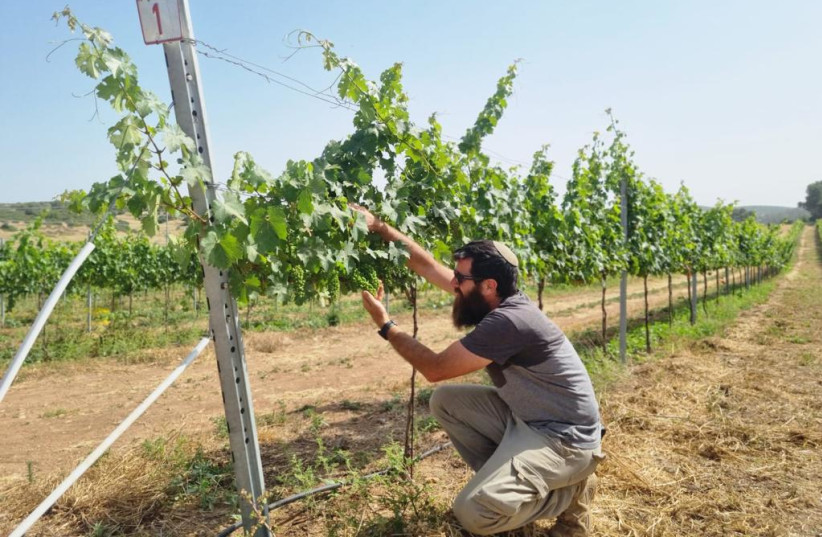
He also studied at the W – Wine & Spirit School in Tel Aviv, where his teacher, coincidentally, was my son, David Montefiore, DipWSET. Jesselson believes in his roots and relates all decisions back to family stories. He named the four quarters of his vineyard after his grandparents, each of whom influenced him greatly. Handsome metal signs proudly carry their names for posterity. But he also remains something of a teacher. He does not only want to immerse himself in the soil, but he feels a compulsion to share the experience.
We sat under his newly designed pergola, sipping a very cold and satisfying glass of Agur White, as he outlined his vision. Jesselson is not only a doer but a talker par excellence! The passion and enthusiasm are overflowing – like a havdalah cup at the close of Shabbat.
The perfectionism streak means he had to surround himself with the best team possible. His choice of partners shows he is aiming high. His viticulturist is Avinoam Inbar, who for many years looked after the vineyards of Domaine Castel, which many say is Israel’s finest winery.
The winemaker associated with the project is Eyal Drory, winemaker of Agur Winery, one of our most promising and fastest improving wineries. Drory is an artist of rare abilities, already receiving great praise for his wines and his hand-crafted vermouths. He is one of the standout winemakers in the current generation.
Jesselson also has a romantic streak. I was most struck by the ancient wine press and old terraces that lie between the olive grove and vineyard. This 21st-century initiative was created totally by chance, apparently situated on a site where wine was made 2,000 years ago.
It is this constant blend of ancient and modern, of biblical Israel with start-up Israel, that makes wine here so absorbing and fascinating. I challenged him with the idea of bringing these terraces back to life and the wine press back into use!
ANAVA VINEYARDS offer the wine lover the chance to be a participant in the Israeli wine scene. This means reserving your own plot, choosing what to plant, and taking part in the planting. You will then, if you choose, be involved in the nitty gritty – cultivating, harvesting, winemaking, and bottling. Finally, you will design your own label and be able to drink your own wine.
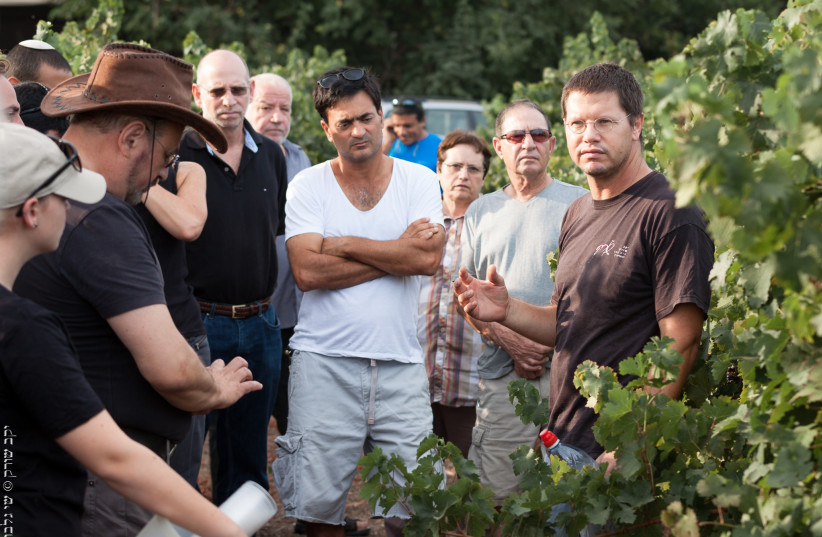
Anava encourages their partners to visit the vines and to fully explore and experience their connection to the land. At all times, expert advice will be on hand. Alternatively, you can be an absentee vineyard owner, directing those same experts to manage your vineyard on your behalf.
Growing wine takes time. Only the patient need apply. Planting will be in 2023. After Orla, the first harvest will be 2026, and from 2027 your own wine will be maturing in barrel or bottle, before the cycle starts again. You can visit your vineyard, entertain in it, or work in it as you choose.
You can discuss the varietal to be planted with the winemaker, balancing your choice with what is suitable for the terroir and the type of wine you want to make. You can even choose which herbs and spices to plant around your vineyard.
Everything will be done according to the agricultural and kashrut laws; thus the finished wine will be kosher, and the vineyard will be grown and managed to be as sustainable as possible.
If you are interested and want to learn more, see the film and the website; or better yet, visit the site. Everything about Anava Vineyards is extremely professional; but if you don’t want to be convinced, be careful about meeting the admirable Nadav Jesselson, who is very impressive, persuasive, and professional rolled into one!
To differing degrees, Wine on the Vine; Soreq Winery Winemaking School; and Anava Vineyards encourage the armchair wine lover to support Israel, be a participant, and become involved in the wine world as a player!
The writer is a wine industry insider turned wine writer, who has advanced Israeli wines for 35 years. He is referred to as the English voice of Israeli wine. www.adammontefiore.com
